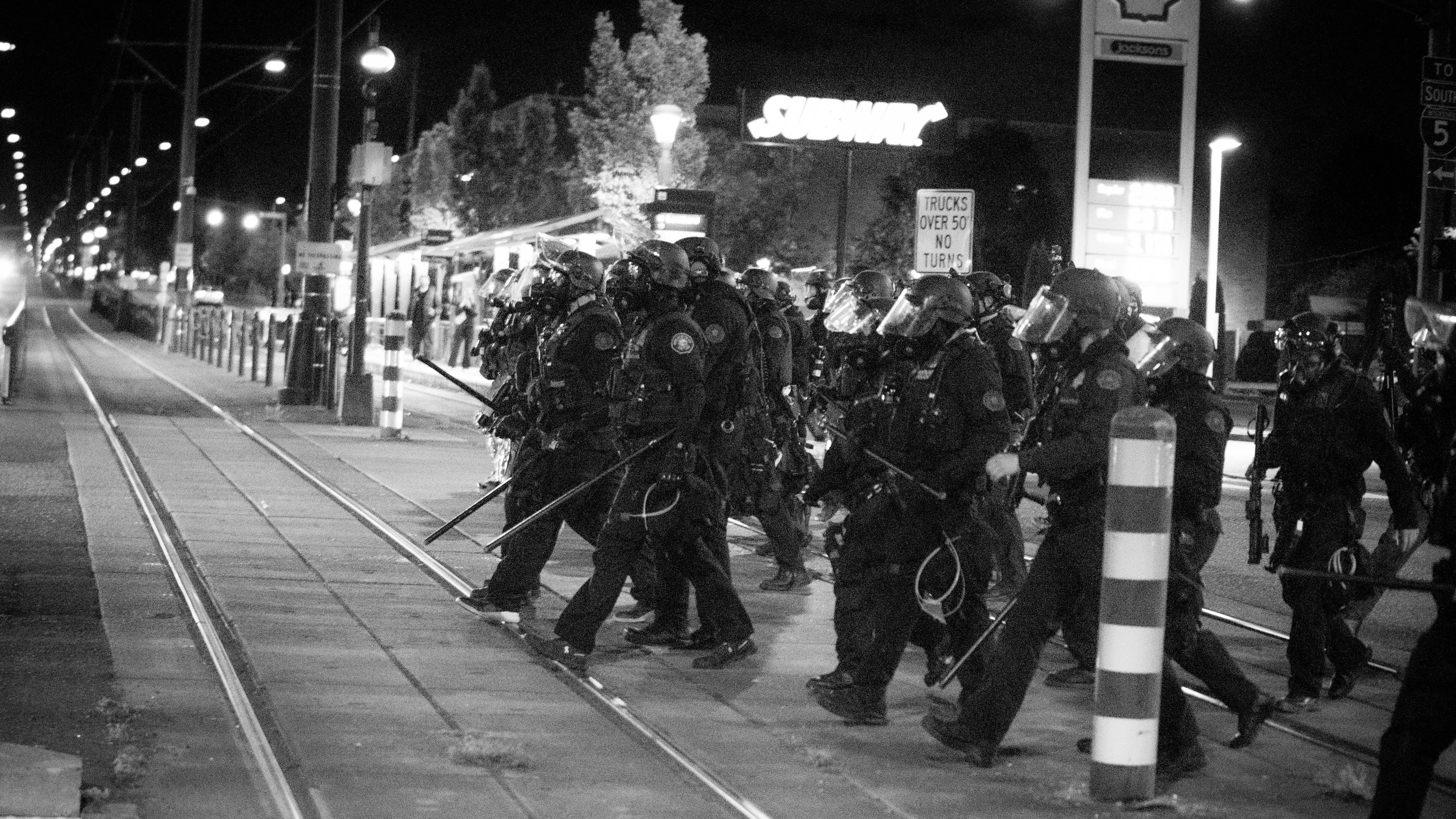It’s been nearly six months since the Portland Police Bureau’s 50-member riot squad, the Rapid Response Team, resigned en masse following the June 15 indictment of one of its members, Officer Corey Budworth.
The group has dissolved, but its legal battles have not. Nor has the cost to taxpayers.
In fact, the city has hired outside counsel to defend three of those officers against lawsuits.
Between March and September, the City Attorney’s Office signed seven contracts with the law firm Hart Wagner LLP to defend Detective Erik Kammerer and Officers Justin Damerville and Craig Lehman—all former RRT members. Each contract is for $20,000, bringing the total budget to $140,000 for all seven.
Typically, the city of Portland defends its police officers against legal claims. But the contracts reviewed by WW, obtained through a public records request, say the city cannot represent the three because of “an actual or potential conflict of interest.”
It’s not the first time local officials have cited potential conflicts related to Detective Kammerer. Last November, the Multnomah County District Attorney’s Office referred a criminal investigation of Kammerer to the Oregon Department of Justice due to an unspecified “potential conflict of interest.” That investigation is still ongoing.
In a statement to WW, City Attorney Robert Taylor said his office “chose to retain outside counsel in these matters in an abundance of caution given the professional rules governing attorneys.”
Taylor declined to comment further or to specify what, exactly, the conflicts are.
Friction between the Police Bureau’s rank and file and the City Attorney’s Office predates most of the recent contracts.
In a June 17 resignation letter, RRT members wrote to Police Chief Chuck Lovell that the unit had a “lack of confidence” in the legal representation provided by the city.
“[E]arly in the demonstrations of 2020, the city commissioners did not support the police,” RRT commander Lt. Jacob Clark wrote. “This led the City Attorney’s Office to not properly support the Police Bureau on a legal front. To ensure the Police Bureau receives proper legal counsel from the City Attorney’s Office, a Police Bureau-focused group has to be independent of political leadership direction.”
It’s not unheard of for the city to retain outside counsel to defend Portland cops. But seven of the 12 police-related contracts the city signed with Hart Wagner since 2010 came in the past eight months.
What makes the recent contracts especially interesting is that Kammerer, Damerville and Lehman are among the city’s most high-profile riot cops.
Last December, Courthouse News first reported, the city agreed to remove Damerville and Lehman from street duty following a preliminary injunction the city had agreed to in federal court, which barred police from arresting journalists and legal observers. The injunction stemmed from a class action lawsuit, led by the American Civil Liberties Union of Oregon, which alleges that 60 unnamed law enforcement officers were “intentionally and indiscriminately attacking neutral members of the press and legal observers.”
Each of the seven contracts signed this year lists a specific court case for which Hart Wagner will defend the officer. Here’s what the contracts cover.
Officer Craig Lehman
The scope of the contract, signed by the city in March, is to “advise, represent, and defend city employee Craig Lehman with respect to any threatened or actual contempt proceeding against him” in relation to the ACLU-led lawsuit, Index Newspapers, et al. v. City of Portland.
Officer Justin Damerville
The two contracts for Damerville state that Hart Wagner will defend him against two separate battery and assault claims filed in federal court by protesters Dmitri Stoyanoff and Marie Tyvoll, stemming from a Sept. 28, 2020, Black Lives Matter protest in Kenton Park.
Stoyanoff’s complaint alleges Damerville and three unknown Police Bureau officers, “for no legal reason,” tried to take Stoyanoff’s sign, which read “Vote Register Here.”
“Damerville roughly pushed a press person out of the way as he moved towards plaintiff,” the complaint alleges, “and [began] spraying Stoyanoff’s head, face and eyes at brutally close range for between 7 and 10 seconds.”
The complaint alleges Tyvoll filmed Damerville’s actions, until he turned on her. The complaint says he and another unknown officer “used unlawful, excessive force against Tyvoll by violently pushing her backwards to prevent her filming, and Damerville spraying her at close range with aerosol pepper spray.”
The complaint says “multiple protesters” and the press recorded video of the incident.
Detective Erik Kammerer
During his tenure with the RRT, Kammerer led the unit’s Delta Squad. The scope of the city’s four contracts for Kammerer, all signed in September, pertain to three protest-related claims and one negligence claim following a vehicle collision:
• An April 2021 lawsuit filed by Hannah Ahern alleging that Kammerer slammed her to the pavement and arrested her after she spat on the ground during an August 2019 protest.
• A lawsuit filed in May by a Portland father named Elijah Warren, who accuses Kammerer of striking him in the back of the head with his baton as Warren spoke to police officers outside his home during a September 2020 protest.
• A battery complaint filed in August 2020 by a protester named Michael Weisdorf, who alleges that numerous unnamed Police Bureau officers knocked him to the ground multiple times as he attempted to flee a protest in July 2020. (Neither the civil complaint nor any of the publicly available court filings name Kammerer, so it is unclear why the city hired outside counsel to represent him in this case.)
• A now-closed lawsuit filed by Aaron McCarthy, who accused Kammerer of veering into McCarthy’s lane in an unmarked police vehicle, thus forcing him into a concrete barrier and causing his vehicle to spin 180 degrees.

